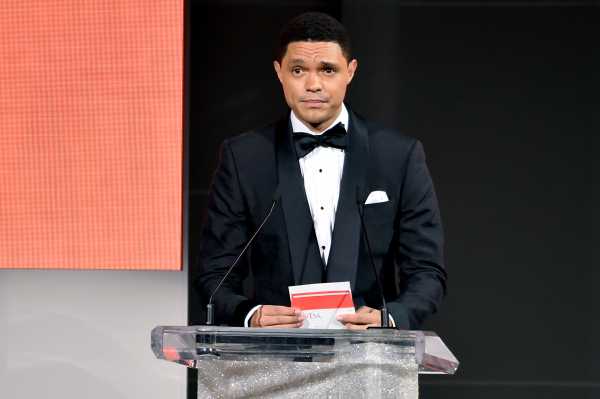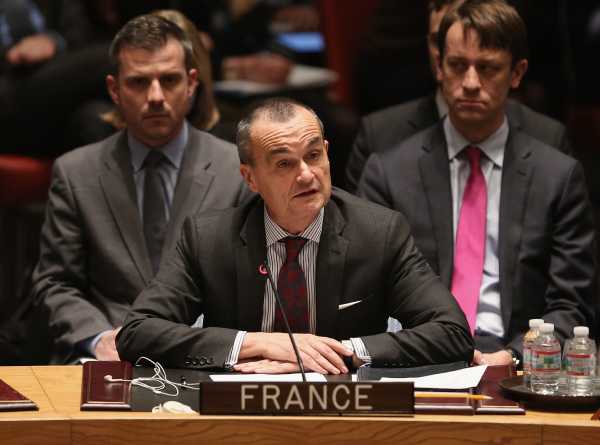
An important intellectual debate is currently playing out involving the French ambassador to the United States — and a late-night comedy host.
During a Monday monologue, Daily Show host Trevor Noah made a joke about France’s World Cup victory. Alluding to the fact that 80 percent of the French team’s players were of African descent, he quipped, “Africa won the World Cup.”
“I get it, they have to say it’s the French team,” said Noah, who is black and South African. “But look at those guys. You don’t get that tan by hanging out in the South of France, my friends.”
French Ambassador Gerard Araud took offense to the comments, and sent a letter to Noah on Wednesday afternoon outlining his complaints. “By calling them an African team, it seems you are denying their Frenchness,” Araud wrote. “This, even in jest, legitimizes the ideology which claims whiteness as the only definition of being French.”
That evening, Noah fired back in a web segment, defending his original joke and arguing that Araud was actually erasing the identity of his nation’s players. It’s a powerful monologue, despite Noah’s attempt to imitate a French accent at the beginning, and deserves to be watched in full:
Ultimately, this isn’t an argument about one joke. It’s a debate about two competing visions for how liberal societies should handle diversity and racism.
Araud is coming from a traditional French perspective, and his argument can’t be understood without grasping the very aggressive vision of assimilationism that’s been dominant there for decades (arguably centuries). Noah understands this, and in his response offers a critique of traditional French approaches to diversity from a progressive, multicultural point of view.
The core issue at stake is deep and philosophical: a divide over the fundamental role of diversity in democracy, one that explains, among other things, a major part of the debate over “identity politics” currently raging in the United States.
So even though this incident started with one comedian’s joke, it’s worth taking quite seriously — as it tells us a lot about modern politics.
The French vision of multiculturalism; or, why France is really pissed at Trevor Noah

The core of Araud’s response to Noah’s initial joke was to argue that the comedian doesn’t really get what it means to be French.
“France is indeed a cosmopolitan country, but every citizen is part of the French identity and together they belong to the nation of France,” Araud writes. “Unlike in the United States of America, France does not refer to its citizens based on their race, religion, or origin. To us, there is no hyphenated identity, roots are an individual reality.”
This approach to race, which may sound bizarre to American ears, reflects widely divergent histories: George M. Fredrickson, an eminent historian of race in France and America at Stanford, dates the origins of the Franco-American disagreement over race all the way back to independence. For a complex web of reasons — ranging from differences over the role of the state to the two revolutions’ differing experiences with religion — America developed a national culture centering on liberal tolerance, whereas revolutionary France focused more on building a shared sense of national identity and unified culture.
The two countries diverged further as they developed. Because France had no large, domestic slave population, preferring instead to enslave Africans in its colonies, race never became the fundamental cleavage in its politics. While both countries experienced mass immigration, immigration to the United States has featured much more non-European migrants (until, roughly, the end of colonialism in the mid-20th century). It was also far easier for immigrants to the US to become citizens without learning the local language and culture.
The result of all this was that French national culture came to view matters of diversity and immigration as issues centering less on tolerance than on assimilation. As Fredrickson puts it:
This history means that traditional French liberals — the camp in which Araud is best situated — have a very particular approach to race and racism.
They believe that the best way to convince French citizens to accept diversity is to convince French whites that Muslims and people of African descent are every bit as French as they are. Playing up their ethnoreligious differences, they believe, only serves to distance them from their essential Frenchness. What’s worse, they argue, it fuels a narrative on the French far right that people who aren’t European by blood can never truly become “French.”
Hence why Noah’s joke about “Africa” winning the World Cup rankled so much. Benjamin Haddad, a French scholar at the Hudson Institute who has worked for President Emmanuel Macron, told me that it sounded like the rhetoric he hears from far-right party leader Marine Le Pen.
“His [Noah’s] original skit, ‘You don’t get that tan in the South of France,’ is Le Pen-level stuff,” explains Haddad. “Many French cringe at this debate because it’s been a far-right talking point for 20 years.”
Noah’s response: an actually funny critique of French immigration policy
Trevor Noah is, of course, coming from a different perspective. A black South African man working in the United States, he’s steeped in the culture of two countries whose entire existences were defined by race and racial oppression. Both nations have, in different and distinct ways, developed official cultures of multiculturalism — a celebration and accommodation of racial differences, rather than an erasure of them — as a means of trying to reconcile racial tensions.
Noah’s response video is essentially an extended defense of this model and a head-on critique of traditional French assimilationism. For one thing, Noah argues, the French model erases the positive pride that Africans, both on the continent and in the diaspora, feel in their common heritage.
“Coming from South Africa [and] watching the World Cup in the United States of America, black people all over the world were celebrating the Africanness of the French players,” he said. “Not in a negative way, but rather in a positive way, going, ‘Look at these Africans who can become French.’ You know what I mean? It’s a celebration of their achievements.”
“When I’m saying they’re African, I’m not trying to exclude them from their Frenchness but include them in my Africanness”
In Noah’s view, insisting that you can’t hyphenate your identity — that you can’t be French-Algerian, but must be either French or Algerian — cuts people off from a valuable sense of pride and community. It’s a vision that strips people of who they are, and of what matters to them, in the name of “assimilation.” A quote from Count Stanislas–Marie–Adélaide de Clermont, offered during the 1789 French National Assembly’s debate over the legal status of Jews after the Revolution, helps sum up what Noah finds objectionable about the French model:
The idea that you cannot have a Jewish community in France, only individual Jews stripped of their Jewish identity, sounds profoundly offensive (at least, it does to this Jew). But Noah argues that Araud, and French national culture, hasn’t moved on from this 19th-century view — that insisting that hyphenate identities are impossible is stripping communities of their core, essential identity.
The point about the far right, Noah argues, is missing vital context. The same line — “these are African players” — means something very different when it’s being said by a black comedian than by a racist French politician, and audiences are smart enough to understand why:
So the issue here, contrary to Araud’s point, isn’t that Noah fails to understand the French model. It’s that he thinks it’s wrong.
Why this fight matters
My own view — cards on the table — is that Noah is the winner in the debate. Araud continues to restate his basic position, even in the tweet above sent after Noah’s response was released, without grasping the subtlety of Noah’s points about context and identity.
But I’m less interested in point-scoring, at least right now, than I am in pointing out the stakes of the argument.
While Araud’s specific arguments are grounded in French identity and history, his basic starting point — that the best way to approach issues of race is a kind of colorblind emphasis on what unites us as citizens — is the same argument that underpins liberal critiques of “identity politics” in the United States.
After the 2016 election, Columbia University professor Mark Lilla wrote a New York Times essay, “The End of Identity Liberalism,” making an argument similar to Araud’s (a piece that also follows a long tradition of liberal hand-wringing about identity in the US). In the piece, Lilla even cited his time taking a sabbatical in France as formative of his opinions on this subject.
American liberalism’s emphasis on identity and difference, Lilla argues, is destroying the foundations of democracy in the country — helping the far right in precisely the way that Araud says:
Lilla proposed replacing “identity politics” with a “post-identity liberalism,” one that speaks “to Americans as Americans … a nation of citizens who are in this together and must help one another.” His proposal, in short, is to Frenchify American liberalism.
Critics of Lilla’s position replied that this would be electorally ineffective — Democrats need minorities, and need to appeal to their particular identities to get them — but, more fundamentally, that it would be wrong.
“What we find in the backlash by liberals against progressives is nothing other than a betrayal of the true and full values of liberalism,” Stanford professor David Palumbo-Liu argued in a Vox essay. “Liberals like Lilla would have us turning back the clock to compete for the leadership of what one might call an ‘off-white America,’ with issues of race and gender and other minority positions relegated to the background.”
This is a more explicitly political twist on Noah’s position. The comedian is arguing that stripping French World Cup players of their Africanness means separating them from an important part of themselves; the professor is arguing that removing identity politics from liberalism is to remove the specific concerns of marginalized groups from the political docket. Both believe that a colorblind liberalism is one that has blinded itself to important parts of what matters to individuals from minority groups.
What’s really at stake here, then, isn’t just a petty feud between public figures — or even a culture clash between two men of different backgrounds. Instead, it’s a profound debate splitting liberals in increasingly diverse democracies — in Europe and in the United States.
Watch: why immigration is crucial to France’s World Cup success
Sourse: vox.com




